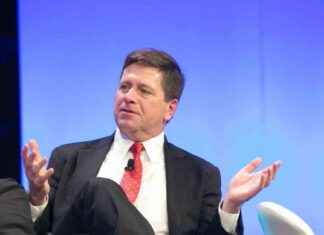Hu’s protégé, Premier Li Keqiang, leaves the standing committee in early retirement that will quell any acts of dissent
MADRID, 22 Oct. (EUROPA PRESS) –
The closing session of the XX Congress of the Communist Party of China this Saturday was marked by an unusual scene: the escorted out of the country’s former president Hu Jintao (2003-2013) in full session, under the gaze of the man next to him that has succeeded him in power and is heading for a historic third consecutive term in the party’s general secretary, Xi Jinping, absolute guide of the country’s destinies for at least the next five years.
The Chinese authorities have not yet offered an explanation for what happened. Footage shows a janitor trying to lift Hu from his seat as the former president appears to resist. Finally, the 79-year-old political veteran stands up and says a few words behind Xi’s back, who just nods, before clapping Prime Minister Li Keqiang, his former protégé, on the shoulder and heading off. at the exit between the shots of the cameras that are capturing the moment.
Experts’ interpretations range from a public act of purge to a forced exit out of unrest — Hu had already shown signs of weakness during the opening session of Congress last week. The only point in common is the humiliation represented for Hu by the fact of leaving, forced, from a place that he has resisted leaving since his arrival in power: the main bench of the hemicycle.
According to CNN, Chinese social networks, highly controlled by the authorities, have not echoed this moment and the US network’s own broadcast in the country was “censored live” when dealing with what happened.
The final greeting between Hu and Prime Minister Li has recalled the ties that both had in the Youth League of the Communist Party, an organization that has become the seed of the political elite — from which Xi was excluded — that accompanied the former president during his mandate, characterized in part by some internal dialogue within the factions of the party.
Thus ends his career which, recalls the CIDOB institute of international studies, was the first leader of the Communist Party of China who did not know the Japanese occupation, the civil war and the triumph of the Revolution as an adult; with an incident that partly refers to what happened in 2007, when a then-weakened Hu Jintao set out to entrench himself in power after removing supporters of former president Jiang Zemin from the party. Jiang’s final “gift” was to elevate Xi into China’s political elite, with long-term victory in mind.
“Hu Jintao has represented a very different China than Xi Jinping. He led a much more collective leadership and had to balance various factions represented on the Politburo Standing Committee. The Hu years were seen as a time of opening up to the outside world and greater tolerance for new ideas,” explains BBC China analyst and correspondent Stephen McDonnell.
All this has finished changing in the XX Congress of the Communist Party that has concluded this Saturday and in which Xi Jinping will assume a historic third consecutive term for the first time as General Secretary; and one in which Prime Minister Li will be shut out of the party’s top decision-making body, his Standing Committee, with a view to early retirement: a political departure as prominent as the physical one starring former President Hu.
Li, 67, had advanced his retirement in recent months and experts assumed that he would take a backseat, even though he was still a year away from mandatory retirement, a rule that does not apply to the secretary general. of the party and the president of the country, after he himself eliminated the limit of mandates and of age to govern.
Along with him, other party veterans have been left out of the Standing Committee, such as the president of the National People’s Congress, Li Zhanshu, 72; the chairman of the Political Consultative Conference, Wang Yang, 67, and vice premier Han Zheng, 68, confirmed the ‘South China Morning Post’.
The successors will be known in the next few hours, probably on Sunday, at the definitive coming-out of the president’s new power leadership, one that will comply to the letter with the amendments to the party’s Constitution that support Xi’s ideas, from the economic situation of the country, to the fight against corruption, through the conflict over the independence of Taiwan, as guiding principles for the future of China.






